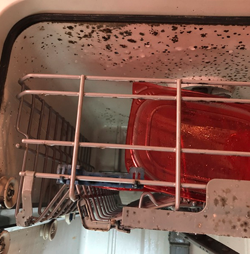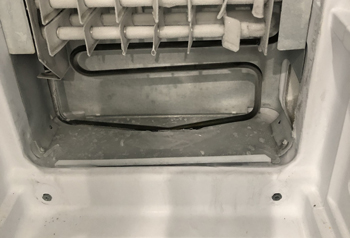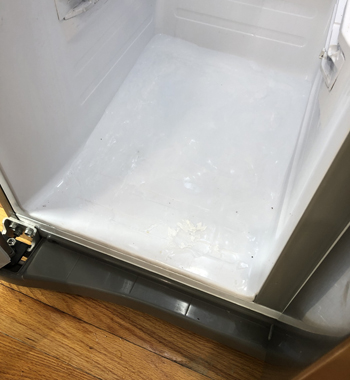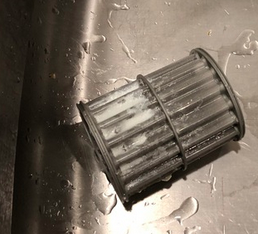I ran a call today on a dishwasher that a client said had a buildup in black mold. That was an understatement. The mold had in fact permeated the plastic inside the Whirlpool dishwasher. Even when you scraped or scrubbed it off you could still see traces of it in the plastic. You could also see it inside the inner recesses of the soap dish and pump. It was scary.
While I’m a big fan of fixing everything possible, in this situation and for the clients health, I advised them to replace the unit. I also decided it might be worthwhile to write this post on the dangers of this situation.
Black mold is a type of fungus that can grow on various surfaces, including inside your dishwasher. While it may not seem like a big deal, black mold can be incredibly dangerous to your health if it’s allowed to spread and permeate your dishwasher. In this article, we’ll take a closer look at just how dangerous black mold can be and why it’s important to take steps to prevent it from growing in your dishwasher.
What is black mold?
Black mold is a type of mold that produces dark, black spots on surfaces. It is often found in damp or humid environments, and can grow on a variety of surfaces including walls, ceilings, and even appliances like dishwashers. Black mold can be incredibly dangerous to your health if it’s allowed to spread, as it produces mycotoxins that can cause a range of health problems.
What are the health risks associated with black mold?
The health risks associated with black mold can be severe, especially if you are exposed to it over a prolonged period. Some of the most common health problems associated with black mold exposure include:
- Respiratory problems: Exposure to black mold can cause respiratory problems such as coughing, wheezing, and shortness of breath. This is because black mold spores can irritate the respiratory system, making it difficult to breathe.
- Allergic reactions: Some people may be allergic to black mold, which can cause symptoms such as itching, redness, and swelling. These symptoms can be especially severe in people with asthma or other respiratory conditions.
- Headaches: Exposure to black mold can also cause headaches, which can range from mild to severe depending on the level of exposure.
- Skin irritation: Black mold can cause skin irritation in some people, especially if they come into direct contact with it. This can cause symptoms such as itching, redness, and rash.
- Neurological problems: In rare cases, exposure to black mold can cause neurological problems such as memory loss, difficulty concentrating, and confusion.
Why is it dangerous to have black mold in your dishwasher?
Having black mold in your dishwasher can be particularly dangerous because it can easily spread to your dishes, utensils, and other kitchen items. This means that every time you use your dishwasher, you could be exposing yourself and your family to black mold spores, which can cause a range of health problems.
In addition, black mold in your dishwasher can also affect the performance of the appliance. Mold can build up in the dishwasher’s filters and pipes, which can cause clogs and prevent the dishwasher from working properly. This can lead to food residue and bacteria building up on your dishes, which can also be harmful to your health.
How to prevent black mold from growing in your dishwasher?
The best way to prevent black mold from growing in your dishwasher is to keep it clean and dry. Here are some tips to help you do this:
- Clean your dishwasher regularly: It’s important to clean your dishwasher regularly to prevent the buildup of food residue and bacteria. This includes wiping down the interior of the dishwasher with a damp cloth and cleaning the dishwasher’s filters and spray arms.
- Keep your dishwasher dry: After each use, make sure to leave your dishwasher open to allow it to dry out completely. This will help prevent moisture from building up inside the dishwasher, which can encourage the growth of mold.
- Use a dishwasher cleaner: You can also use a dishwasher cleaner to help prevent the growth of mold and bacteria inside your dishwasher. These cleaners are specifically designed to remove food residue and other debris from the dishwasher’s interior.
- Check for leaks: Make sure to regularly check your dishwasher for leaks, as these can also contribute to the growth of mold. If you notice any leaks, have them repaired as soon as possible.
In conclusion, it is always better to prevent black mold if possible since not doing so can lead to tremendous issues later on.







